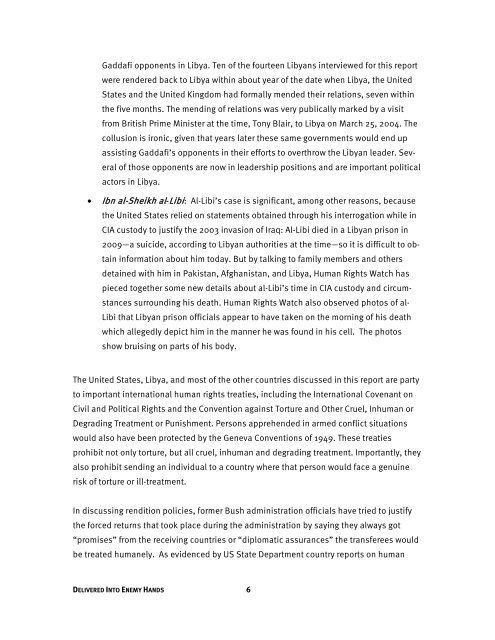Delivered Into Enemy Hands - Human Rights Watch
Delivered Into Enemy Hands - Human Rights Watch
Delivered Into Enemy Hands - Human Rights Watch
Create successful ePaper yourself
Turn your PDF publications into a flip-book with our unique Google optimized e-Paper software.
Gaddafi opponents in Libya. Ten of the fourteen Libyans interviewed for this report<br />
were rendered back to Libya within about year of the date when Libya, the United<br />
States and the United Kingdom had formally mended their relations, seven within<br />
the five months. The mending of relations was very publically marked by a visit<br />
from British Prime Minister at the time, Tony Blair, to Libya on March 25, 2004. The<br />
collusion is ironic, given that years later these same governments would end up<br />
assisting Gaddafi’s opponents in their efforts to overthrow the Libyan leader. Several<br />
of those opponents are now in leadership positions and are important political<br />
actors in Libya.<br />
• Ibn al-Sheikh al-Libi: Al-Libi’s case is significant, among other reasons, because<br />
the United States relied on statements obtained through his interrogation while in<br />
CIA custody to justify the 2003 invasion of Iraq: Al-Libi died in a Libyan prison in<br />
2009—a suicide, according to Libyan authorities at the time—so it is difficult to obtain<br />
information about him today. But by talking to family members and others<br />
detained with him in Pakistan, Afghanistan, and Libya, <strong>Human</strong> <strong>Rights</strong> <strong>Watch</strong> has<br />
pieced together some new details about al-Libi’s time in CIA custody and circumstances<br />
surrounding his death. <strong>Human</strong> <strong>Rights</strong> <strong>Watch</strong> also observed photos of al-<br />
Libi that Libyan prison officials appear to have taken on the morning of his death<br />
which allegedly depict him in the manner he was found in his cell. The photos<br />
show bruising on parts of his body.<br />
The United States, Libya, and most of the other countries discussed in this report are party<br />
to important international human rights treaties, including the International Covenant on<br />
Civil and Political <strong>Rights</strong> and the Convention against Torture and Other Cruel, Inhuman or<br />
Degrading Treatment or Punishment. Persons apprehended in armed conflict situations<br />
would also have been protected by the Geneva Conventions of 1949. These treaties<br />
prohibit not only torture, but all cruel, inhuman and degrading treatment. Importantly, they<br />
also prohibit sending an individual to a country where that person would face a genuine<br />
risk of torture or ill-treatment.<br />
In discussing rendition policies, former Bush administration officials have tried to justify<br />
the forced returns that took place during the administration by saying they always got<br />
“promises” from the receiving countries or “diplomatic assurances” the transferees would<br />
be treated humanely. As evidenced by US State Department country reports on human<br />
DELIVERED INTO ENEMY HANDS 6
















